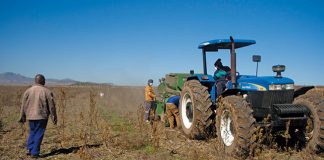If all goes well, this law will be in effect by the end of the year or early next year. This was according to DRDLR spokesperson Mtobeli Mxotwa. He said the communal land tenure bill would institutionalise land use rights, which would enable communal land users to use the land as collateral to raise funds from banks. He said that once signed into law, the communal land tenure bill would protect the land from speculators and market vagaries. Mxotwa said the law would also make it impossible for people living in rural and communal areas to lose their land if they defaulted on their loans.
He explained that it would entitle community property associations to have first right of refusal, while government would have second right of refusal when communal land-holders decided, or were forced, to sell their land. “The land will be protected from unscrupulous creditors who would otherwise take away the land to recoup their losses,” said Mxotwa.
Aggrey Mahanjana, African Farmers’ Association of South Africa (Afasa) general secretary, said any effort on the part of government to introduce a strategy for the proper administration and management of communal land, was welcomed. Mahanjana said communal land had always been a concern to Afasa, as the majority of the smallholder farmers were farming on communal land.
Because not everyone would have access to land reform farms, it was very important that communal land was utilised properly, Mahanjana said. Diale Mokgojwa, Standard Bank’s AgriBEE manager, told Farmer’s Weekly the bank was interested in developing smallholder farmers into commercial farmers through specially formulated finance schemes, but with strict terms and conditions.













